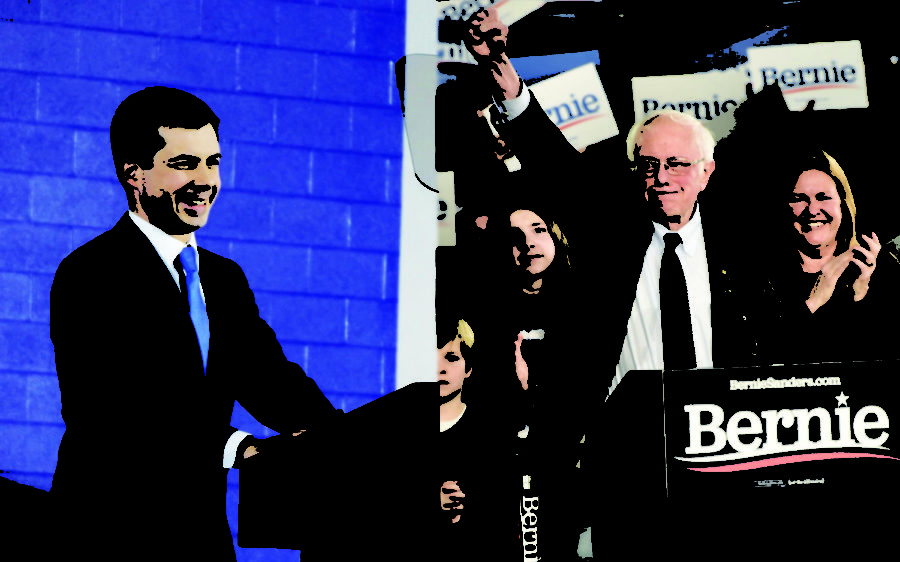Pete Buttigieg and Bernie Sanders in tight Iowa race with partial results
February 4, 2020
Pete Buttigieg narrowly leads partial results of the 2020 Iowa Democratic caucuses after the Iowa Democratic Party’s (IDP) release of 71 percent of precinct results following unprecedented delays. Buttigieg slightly trails Bernie Sanders in the popular vote but leads in state delegate equivalents (SDE).
Speaking at a press conference broadcast live from Des Moines, the IDP Chair Troy Price said just before 4 p.m. Tuesday results from 62 percent of precincts from all 99 Iowa counties would be released in “just a couple of minutes.”
During the press conference, Price called the circumstances surrounding the caucuses that took place late Monday “unacceptable.”
“As chair of the party, I apologize deeply for this,” Price said. “Last night we were faced with multiple reporting challenges and decided out of an abundance of caution to protect the integrity of the Iowa caucuses and their results by taking the necessary steps to review and confirm the data. A thorough transparent and independent examination of what occurred yesterday will follow. But let me be clear, my number one priority has been ensuring the accuracy and the integrity of the results, and we have been working all night to be in the best position to report results.”
Shortly after Price’s press conference, the partial results appeared on the IDP’s results webpage at https://results.thecaucuses.org/. Further results were added after 10:40 p.m. Tuesday.
While Buttigieg leads with more state delegate equivalents than his closest opponent Sanders, the Vermont senator led Buttigieg in the popular vote according to the partial results as of 11 p.m. Tuesday.
Buttigieg had 419 SDEs to Sanders’ 394, while Sanders led Buttigieg in the first preference votes by 31,322 to 27,418 and in final preference votes by 32,673 to 31,353 according to the IDP results page.
The former South Bend, Indiana mayor had seemingly declared victory on caucus night.
“[B]y all indications we are going on to New Hampshire victorious,” Buttigieg said to supporters late Monday in Des Moines.
No official results had been released at that point, though major campaigns kept track of results in precincts around the state and released partial internal campaign data of results throughout Monday night and Tuesday.
In an interview with CNN after the initial release of results, Buttigieg said the results amounted to a “remarkable victory for our campaign’s vision and message.”
“I’m just so humbled by the support that we got from as far as I can tell — and I haven’t seen the very latest map — but as far as I can tell, every different part of the state, different kinds of communities, a lot of those counties that famously switched from President Obama to Trump and now we need to bring back into the fold,” Buttigieg said to CNN. “It’s just an extraordinary validation for our belief that we can unify people and unify people both to lead and to win in an election that we can’t afford to lose.”
Should Buttigieg prevail in the caucuses, he would be the first openly gay person in American history to win a state presidential nominating contest.
A Sanders campaign adviser, Jeff Weaver, released a brief statement in the wake of the release of partial results by the IDP.
“We want to thank the people of Iowa,” Weaver said in the statement. “We are gratified that in the partial data released so far it’s clear that in the first round and second round more people voted for Bernie than any other candidate in the field.”
Elizabeth Warren trailed the top two candidates in the two rounds of preferences votes and in SDEs. Behind Warren in the partial results were Joe Biden in fourth place and Amy Klobuchar in fifth.
In Story County, with about 77 percent of precincts reporting, Sanders led Warren with roughly 32 percent of SDEs to Warren’s roughly 26 percent.
The IDP had never before delayed results or released such a high proportion of the precinct results all at once. The IDP did not respond to emails by deadline requesting information on whether further results would be released Tuesday and did not answer a phone number provided for press inquiries.
The historic delay in the results process led to an intervention by the chairman of the Democratic National Committee, Tom Perez.
“What happened last night should never happen again,” Perez said in a statement. “We have staff working around the clock to assist the [IDP] to ensure that all votes are counted. It is clear that the app in question did not function adequately. It will not be used in Nevada or anywhere else during the primary election process. The technology vendor must provide absolute transparent accounting of what went wrong. Our immediate goal is to ensure that every vote is counted as quickly as possible. Accuracy is our guidepost.”
Nevada is the third state to participate in the Democratic Party’s presidential nominating process, its caucus is slated for Feb. 22. The chair of the Nevada Democratic Party, William McCurdy II, released a statement on their scheduled caucuses.
“[Nevada Democrats] can confidently say that what happened in the Iowa caucuses last night will not happen in Nevada on February 22nd,” McCurdy said in the statement. “We will not be employing the same app or vendor used in the Iowa caucus. We had already developed a series of backups and redundant reporting systems, and are currently evaluating the best path forward.”
The next state with a presidential nominating contest is New Hampshire, its primary election is scheduled for Tuesday.







